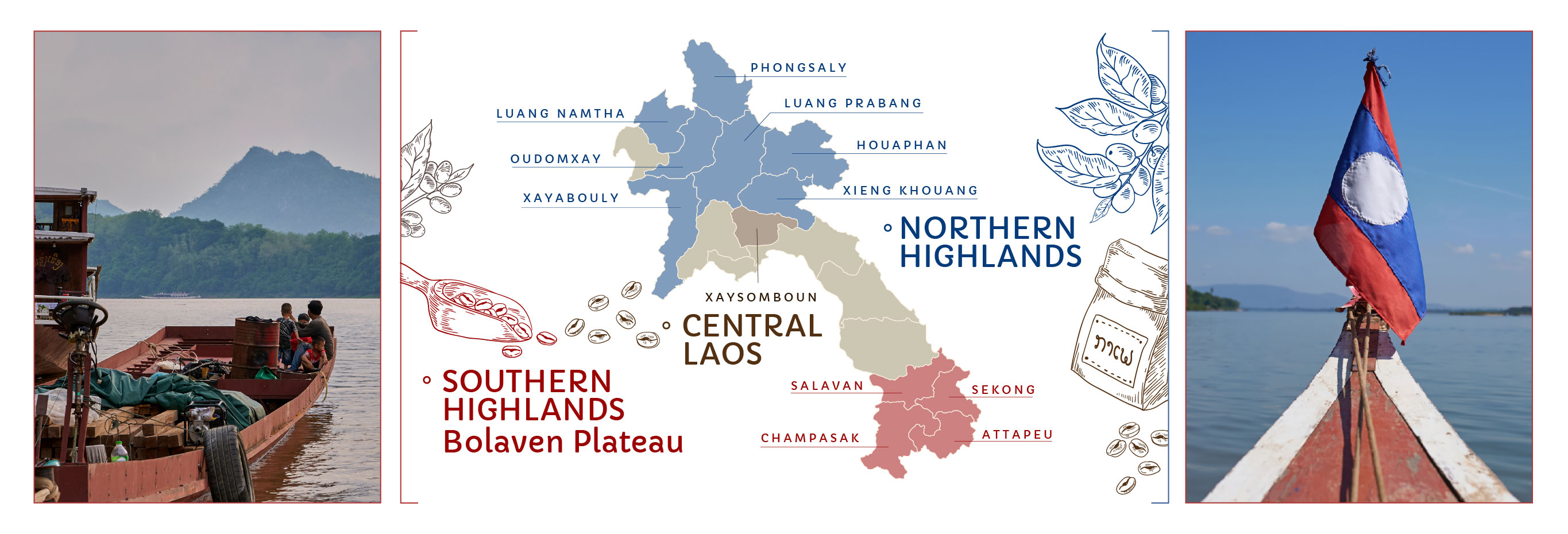Coffee in Houaphan Province
Houaphan in northeastern Laos, bordering Vietnam and Xiang Khouang, is known as the birthplace of the Lao People’s Democratic Republic.
The rugged terrain, shaped by the Annamite Range, features steep mountains and fertile valleys ideal for coffee cultivation. Arabica thrives at altitudes between 800–1,200 metres, where the forest canopy provides shade and slower bean maturation enhancing flavor complexity.
The province’s tropical monsoon climate and nutrient-rich soils also support organic farming, despite some challenges from soil acidity.
Yuni Coffee Co.’s Xam Tai single-origin coffees have flavors of lemon and cocoa to strawberry and citrus - a prime example of sustainable Lao coffee. Photo by Nicole Motteux.
Home to over 25 ethnic groups, including the Hmong, Tai Deng, and Khmu, Houaphan integrates coffee farming with traditional silk and cotton weaving, diversifying incomes while preserving cultural heritage.
After decades of neglect due to poor infrastructure and market access, revitalization efforts led by the government, international projects, and private investment have transformed the coffee sector.
Its capital, Xam Neua, now has a new airport. Improved infrastructure and processing facilities now help farmers produce premium Arabica coffee, making Houaphan a key player in Laos’ specialty coffee industry.
Case Study – Yuni Coffee
When Yuni Coffee Co. arrived in Houaphan province, they found a neglected and stagnant coffee industry.
Coffee had been planted in the area in 1993 to replace opium cultivation, but had not produced marketable quantities. Farmers lacked the knowledge to care for or process coffee properly, and without buyers, they couldn't earn money from it.
Yuni Coffee set about to change that, working directly with local communities to improve coffee farming techniques and processing.
Fast forward to today, and Yuni Coffee supports 160 farming families across four districts, including Xam Tai and Vieng Xai. The company provides seeds, training, and nursery supplies, avoiding debt and reinvesting profits into community projects.
They have established critical infrastructure, including three wet mills, a central dry mill, a roastery, and a cafe in Xam Neua. These facilities enable farmers to process beans for specialty markets, improving quality and value.
Yuni employs 19 full-time staff and offers seasonal work to 50 people during harvest. They also train youth in business and hospitality, providing additional skills and employment paths.
Yuni Coffee Co. revitalizes northern Laos coffee with investments that enhance quality and sustainability, fostering community unity. Photo by Nicole Motteux.
In the 2023/24 harvest season, Yuni Coffee produced 7,500 kg of green coffee beans, including 2,500 kg of naturally processed coffee, 1,000 kg of washed processed coffee, and 500 kg of roasted coffee for domestic sales.
Looking ahead, Yuni plans to distribute 250,000 coffee seedlings and export a full container of specialty coffee by 2025. Green coffee bean production is on track to reach 20,000 to 30,000 kg by 2028.
Their efforts are transforming coffee into a viable cash crop, blending traditional farming with modern techniques to position Houaphan as a leading coffee-producing region in Laos.
Origin Highlights
History & Hiking in Houaphan
Houaphan Province, in northeastern Laos, is a remote and beautiful region of mountains, forests, and valleys. Its capital, Xam Neua, lies on the Xam River, bordering Vietnam.
The Viengxay Caves is a vast limestone network that sheltered thousands of people during the Indochina Wars, including housing schools, hospitals, and government offices. The Hintang Archaeological Park spans 12 km, its towering standing stones linked to ancient burial practices.
Laos’ largest and most biodiverse protected area, the stunning Nam Et-Phou Louey National Park, is a must for any hiker or nature enthusiast. Covering 4,107 km2, it is home to over 300 species of birds and 50+ mammals, including tigers, leopards, and gibbons. Visitors can explore the park with wildlife tours, river safaris and forest glamping or ethnic homestays.
Houaphan’s Tai Daeng, Tai Dam, and Hmong communities are also known for their intricate silk weaving and traditional crafts.
Houaphan's single-origin coffee grows in beautiful landscapes with forests and waterfalls
Case Study – Vanmai Coffee Cooperative
Founded in 2019 by former opium farmers, the Vanmai Coffee Cooperative embodies sustainable agricultural transformation. The cooperative has 386 families from 12 villages, cultivating 400 hectares of Arabica coffee above 800 metres using organic methods.
Vanmai exported 19 tons of coffee to France in 2021, with the support of the United Nations Office on Drugs and Crime (UNODC), aiming to increase this to 200 tons by 2025. By creating sustainable incomes, restoring ecosystems, and preserving cultural heritage, Vanmai demonstrates how coffee farming can transform rural communities.
Houaphan province, with its rich cultural heritage, exceptional biodiversity, and natural advantages, is gaining recognition as a hub for premium coffee.
Efforts by enterprises like Yuni Coffee and the Vanmai Coffee Cooperative are driving sustainable development, creating livelihoods, and elevating Houaphan in the global coffee market.
Vanmai Coffee Cooperative members showcase their sustainably produced coffee, highlight community transformation and environmental commitment.
Vilayphone Phommasone, a leader from Vanmai Coffee Cooperative presents their sustainably sourced coffee, emphasising the role women play in the coffee industry. Photo by Nicole Motteux











